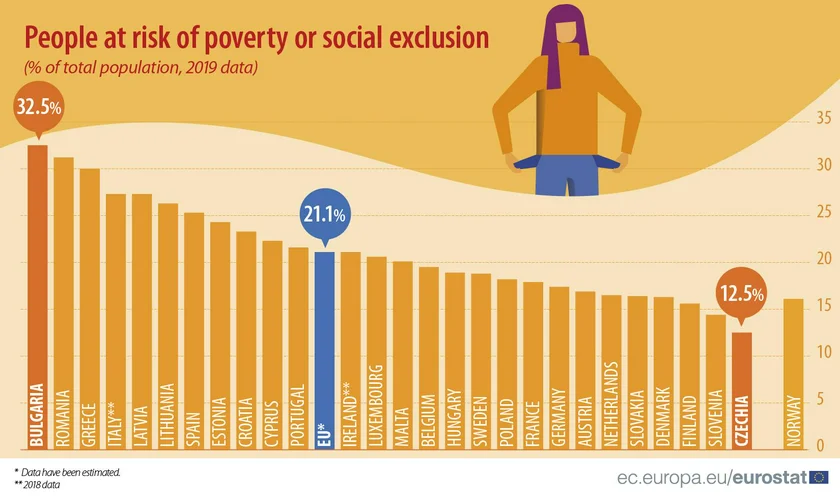People in the Czech Republic have the least risk in the EU of falling into poverty or social exclusion, according to data from Eurostat issued ahead of the International Day for the Eradication of Poverty on October 17.
Based on figures from 2019, Czech also were the hardest working, with the fewest people under 60 working at less than 20% of their total work potential during the past year. Also, only a small percentage of Czechs should be having trouble paying their bills and being able to afford a vacation.
The data on poverty and social exclusion from 2019 will serve as a benchmark for analyzing the economic and social impact of the current COVID-19 pandemic.
In 2019, 21.1% of the population in the European Union, or some 92.4 million people, were at risk of poverty or social exclusion, slightly down from 2018 when it was at 21.6%.
Over one-quarter of the population was at risk of poverty or social exclusion in seven EU countries: Bulgaria (32.5%), Romania (31.2%), Greece (30.0%), Italy and Latvia (both 27.3%, 2018 data for Italy), Lithuania (26.3%) and Spain (25.3%).
The lowest percentages of people at risk of poverty or social exclusion were in the Czech Republic (12.5%), Slovenia (14.4%), Finland (15.6%), Denmark (16.3%), Slovakia (16.4%), the Netherlands (16.5%) and Austria (16.9%).
“In 2019, 16.5% of the EU population were at risk of poverty after social transfer (income poverty), down from 16.8% in 2018. Income poverty describes the proportion of individuals living in a household whose disposable income is below the national at risk of poverty threshold. As the thresholds reflect actual income distribution in the countries, they vary greatly both between Member States and over time,” Eurostat stated.

Across the EU over one in five people risked income poverty in Romania (23.8%), Latvia (22.9%), Bulgaria (22.6%), Estonia (21.7%), Spain (20.7%), Lithuania (20.6%) and Italy (20.3%, 2018 data).
The lowest rates were observed in the Czech Republic (10.1%), Finland (11.6%), Slovakia (11.9%), Slovenia (12.0%), Hungary (12.3%), Denmark (12.5%), the Netherlands (13.2), Austria (13.3%) and France (13.6).
Some 5.6% of the EU population were severely materially deprived in 2019. Their living conditions were seriously affected by insufficient resources to afford to pay their bills, keep their home adequately warm, or take a one-week vacation away from home.
This proportion has fallen compared with 2018, when it was 6.1%. The proportion of those severely materially deprived in 2019 varied significantly, ranging from 19.9% in Bulgaria, 16.2% in Greece and 14.5% in Romania to less than 3% in Luxembourg (1.3%), Sweden (1.8%), Finland (2.4%), the Netherlands (2.5%) and Denmark, Germany, Austria and Slovenia (all 2.6%) as well as the Czech Republic (2.7%).
In 2019, 8.5% of the population aged less than 60 years in the EU lived in households where the adults worked less than 20% of their total work potential during the past year.
This proportion was lower compared with 2018, which was at 8.8%. Greece (13.8%), Ireland (13.0%, 2018 data), Belgium (12.4%), Italy (11.3%, 2018 data), Spain (10.8%), Finland (9.7%), Bulgaria and Denmark (both 9.3%) as well as Croatia and the Netherlands (both 9.2%) had the highest proportions of those living in very low work intensity households.
The Czech Republic (4.2%), Poland (4.7%), Malta (4.9%), Hungary (5.0%), Slovenia (5.2%) and Estonia (5.4%) had the lowest.
The statistics exclude the United Kingdom, which left the European Union on January 31, 2020.












 Reading time: 2 minutes
Reading time: 2 minutes 


 English
(Proficient)
English
(Proficient)























